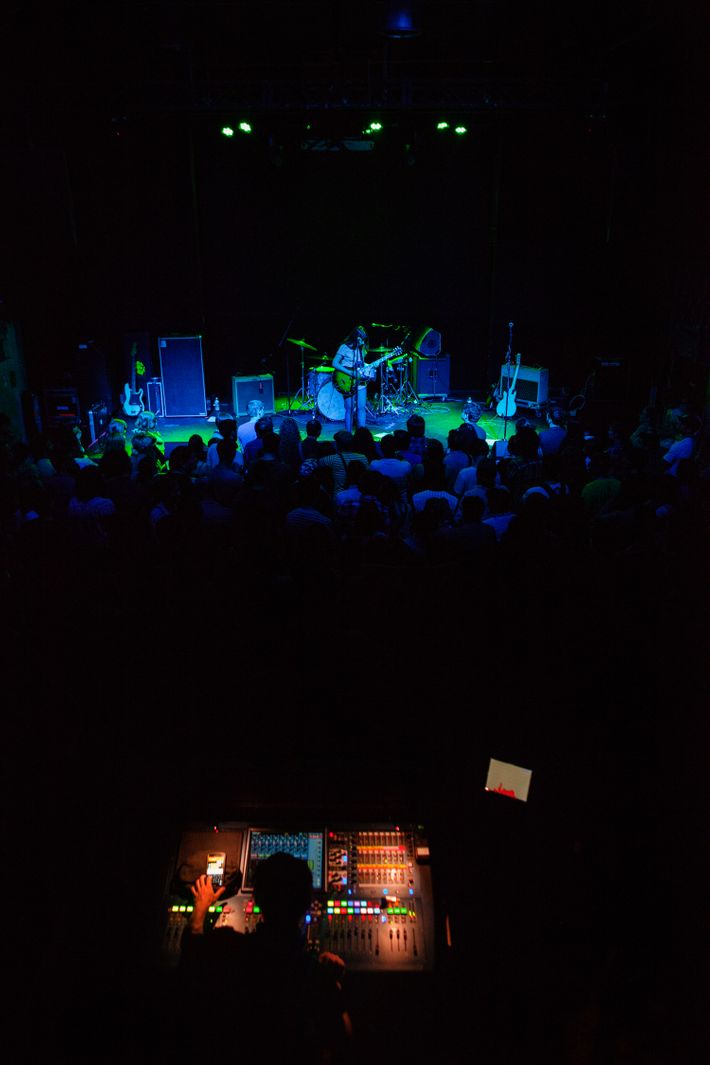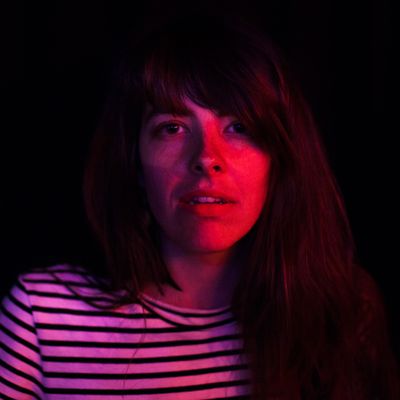
Toward the end of Hop Along’s set at Williamsburg’s Rough Trade Tuesday night, the rest of the band leaves Frances Quinlan onstage to sing “Happy to See Me,” a vocally unbelievable song off the vocally unbelievable Painted Shut, their second record as a full band, which came out that day. It’s hard to keep a standing crowd quiet, but the 300-person audience stood transfixed, waiting for whichever note, whichever tone, Frances, the lead vocalist of the Philadelphia-based band, would sing next. A cup drops, and everyone looks at the culprit furiously; I fight with all I have to hold in an allergy-season sneeze. Then it happens. It happened earlier that day, at a taping of WNYC’s “Soundcheck,” when she broke from the melody of “Horseshoe Crab,” lingering on one high note until her voice gave out; it happened during the actual soundcheck, when the sound guy heard her sing the first note of “Texas Funeral,” opened his eyes wide, and stopped doing his job for a second; it happened later that soundcheck, when a teen walked away from a friend mid-conversation to film a few seconds on her phone: Frances Quinlan has the ability to make a room stop breathing with her voice.
With not-ideal-for-this-humidity bangs, she’s small and unassuming and looks like she could be Feist’s little sister. But her voice demands attention. Every review of Hop Along’s acclaimed new record essentially says the same thing: “That voice, though.” “An abrasive snarl and a smooth croon.” “Full-throated bourbon howl.” “Pungent and potent.” “Raggedy and raw, with a wild, untameable streak.” New York’s Lindsay Zoladz probably summed her vocals up best when describing the band’s lead single, “Waitress”: “Something about it is violently sweet, like a bite of cake so sugary that it actually causes you physical pain. Her delivery is ecstatically wide-eyed and her tone is gravelly, like a chain-smoking toddler who is about to punch you in the mouth.”
Do you want to know what it’s like? Here is the bridge of “Happy to See Me.” It’s out of context, but you’ll get it.
Sure, saying someone is “the best singer in rock music today” feels as antiquated as saying someone is the “best upright bass player in jazz today” (remember when Esperanza Spalding beat Justin Bieber for the Best New Artist Grammy?), as any grand declaration about music that is not about pop or mainstream rap seems a bit absurd. Neither Frances nor her bandmates know what it means to be a guitar band in 2015, but one simple truth hasn’t changed: A truly great voice is worth shining a spotlight on.
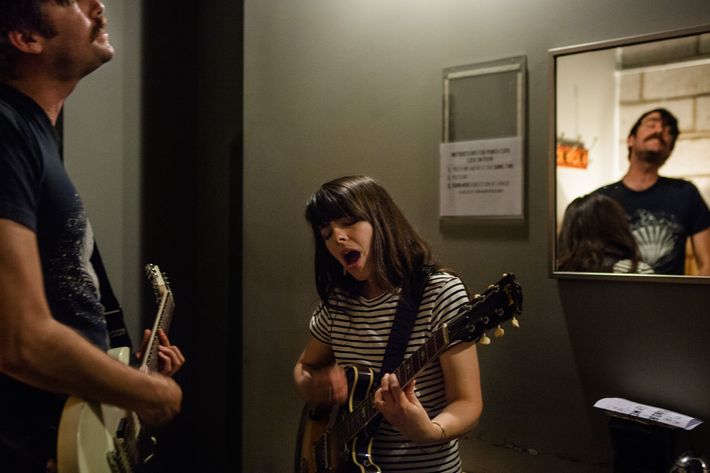
“That’s the issue I have: People compare me to Janis Joplin a lot,” Frances explains as we wander through Rough Trade’s record store section a couple hours before the show. She is friendly but earnest. New to this whole being-interviewed thing, she’s still a little uncomfortable doing press, but at 29, she’s very composed. “I get [it], but I’m not a huge Janis Joplin fan.” It’s the rasp, which her brother and bandmate Mark speculates showed up when she had to start being louder than his ex-metal-band-member drums. However, Frances is not Janis Joplin, nor, say, the lead singer of AC/DC, rasping just to rasp. She can get there but she uses it sparingly, balancing it with a Joanna Newsom–like vocal whimsy. Unlike Joplin, Frances doesn’t have a “big” voice, historically the rock Establishment’s most prized description it gives female lead singers because of the masculinity it implies. No, Frances’s voice doesn’t feel big; it feels vast.
As her brother Mark describes it, Frances was always a natural. “She’s just magic with that thing,” he tells me backstage before the show. “She has been since she picked up a guitar.” Frances started singing at age 6, inspired by her artist mother, who always sang along to the radio. Her first performance was at age 7, when she sang the laughably inappropriate “What’s Love Got to Do With It.” “There was this moment when I knew she wanted to play guitar and I was like, ‘Okay, I play the guitar, it’s fun. I can see this going somewhere.’ And it was like five months in, and she was singing and playing the guitar. It was unbelievable. I saw immediately that this was special, this was something.”
“I played her 18th birthday party many years ago,” Frances tells me when I pick up fellow Philadelphian Waxahatchee’s breakthrough new album. This was eight or so years ago, and Hop Along was a very different thing. Then called Hop Along, Queen Ansleis, Frances was a solo artist, playing freak-folk in the Kimya Dawson vein, dreaming that Saddle Creek would sign her off the demo she mailed them. (It took ten years, but Hop Along is now signed to Saddle Creek.) She released her first album, the charming but uneven Freshman Year, in 2006, while still at art school in Baltimore, majoring in painting (she designs all the album art) and minoring in creative writing. She wanted to be in a proper band, but that wouldn’t happen until she graduated and moved into Mark’s basement in Philadelphia. Mark’s band had just broken up, so they eventually decided to jam, with him on drums. Mark’s friend Tyler Long joined to play bass in 2009. It was that year they started recording Get Disowned, with fellow local musician Joe Reinhart producing. The album would take three years to record but it received small-scale acclaim, eventually earning Hop Along the title of Philadelphia’s Best-Kept Secret. Soon after, Reinhart would join the band as their full-time guitar player.
Each of the members admits to having very distinct tastes, and with each new addition, Hop Along added to their sound — Mark’s hard-rock drumming; Long’s Americana bass-playing; Reinhart’s, as Mark describes it, “snakelike” emo, math rock, Beatles-era George Harrison guitar-playing — to the point that with Painted Shut, it has become incredibly hard to describe their sound. I asked a lot of friends to listen to the record, and everyone said something different: the Cranberries meets the Strokes, but not. Björk meets Nirvana, but a very specific Nirvana. If Pablo Honey Radiohead were super into In Rainbows Radiohead and Thom Yorke were a woman with strep throat.
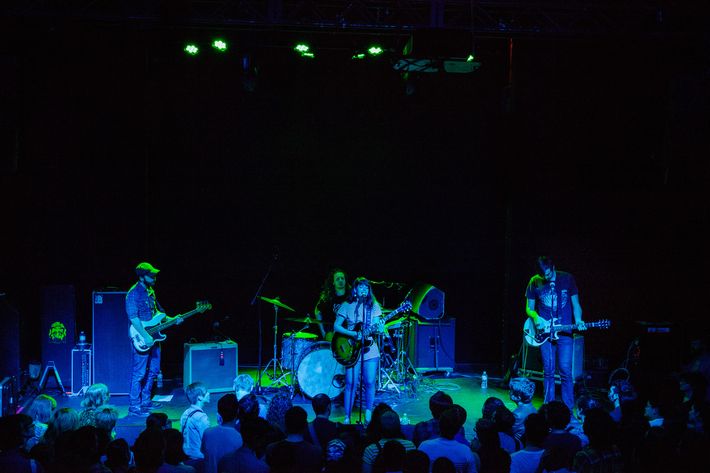
While every comparison zeroes in on the voice, Hop Along is a band, and it operates as a democracy. Frances is tough on herself, an admitted perfectionist about her vocals (“I just hear so many of my own limitations because what you write and what you want to have happen are just two different things”), but she doesn’t appear to carry that over to the guys. She’s not the boss. That said, all the songs do start with her and her words. The latter is a point she uses to separate herself from Joplin: “It’s so much about her voice that it doesn’t matter what the song is about.” And Frances prides herself in her songs being about larger themes, whether it’s mental illness, poverty, or mortality.
“I was hanging out at the Met with one of my friends, and he was like, ‘Who’s your favorite artist?’ and I was like, ‘Louis C.K.,’” Frances says as we browse the meager four-album comedy section. “I just think he’s doing the most important work in art right now.” I can see why. C.K. plays his show’s protagonist, but the best episodes are ones in which he uses his character as an observer of another person’s tragic behavior. Frances’s best songs do the same thing. “Powerful Man” tells the story of seeing a little kid being hit by his dad. “I Saw My Twin” starts with the lyrics, “I saw my twin working in a Waffle House,” which already sounds like a premise for a Louie cold-open. She sings “Horseshoe Crabs,” which is about Jackson C. Frank, a highly influential but commercially unsuccessful (and eventually schizophrenic) folk artist, in the first person, so that midway through it becomes unclear if she’s singing about him or about herself playing one of his songs. It works because the humanity in her voice creates the feeling of looking at a subject from many perspectives at once, as if the song were a Cubist painting.
“I wish I could start with just the sound of words and build around that,” she explains while we search for the Nick Drake album she says she always looks for but never buys because she’s a self-proclaimed “cheap-ass.” (“I just want to see that it’s there.” [Editor’s note: It wasn’t.]) The reason why songwriters start with the tune is that it’s a lot easier for phrasing the lyrics. But with Frances, having to figure out ways to fit the words into the music contributes to the push-pull in her melodies. Take the refrain of “Buddy in the Parade,” which is written as, “Don’t go out,” but is sung as, “Go out, don’t.” “I always end up making it harder for myself,” she says. Also, more important, as she tells me, without these stories in her mind while she sings, she wouldn’t be able to hit the notes.
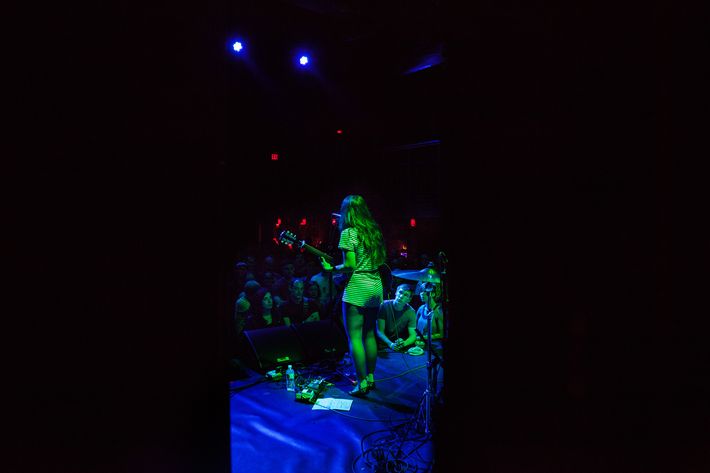
“It’s time to exit with some grace,” Frances sings with a hush, alone again onstage, playing Disowned’s “Some Grace” as an unplanned encore. She shifts to a belt: “Now that you’ve given only what you know how to.” She messes up the guitar part a little, but the silent crowd doesn’t notice. The song features a long refrain that on the record is sung as two parts, but Frances does both, of course.
On my way out, I run into Anika Pyle, lead singer of the terrific angsty band Chumped (who wrote an essay for Vulture last year about women in punk). I ask what she thought of the show. She fawns over the band, calling her contemporary Frances one of her “biggest inspirations.” Before Louis C.K. was Louie, he was a comic’s comic, the one comedians would always go out of their way to see perform, before basketball arenas filled with fans. For now, Frances is a rock singer’s rock singer. It isn’t a title like “best voice in rock music today,” but it’s pretty good.
